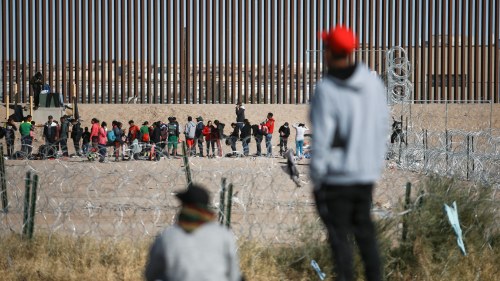Foreign Policy Matters: Immigration Divides Americans

Democrats and Republicans Starkly Divided on Immigration Policy
As the 2024 presidential election draws closer, a new Chicago Council on Global Affairs-Ipsos survey finds immigration remains a deeply polarizing issue within the American electorate. Of the eight different policy options included in the poll, not one received majority support from both Democrats and Republicans. Where does each party stand?
GOP supporters broadly back increased deportations, an expanded border wall with Mexico, and increased penalties on businesses for hiring people without legal work permits. Democrats, on the other hand, tend to favor policies that make it easier for immigrants to legally come to and stay in the United States.
Read the full report.
The Data Dimension
When asked about the global issues upon which Washington should focus, immigration-related concerns are top of mind for many Americans. In a separate Council-Ipsos poll, more than half (53%) say US leaders aren’t giving the US-Mexico border enough attention, including 82 percent of Republicans.
What We're Watching
- Young Russians on global threats: A joint Council-Levada Center survey finds seven in 10 consider international terrorism to be a very dangerous threat to Russia’s national interests—more than the number of those who say the same about the war in Ukraine.
- The race for rare earth elements: Council Fellow Karl Friedhoff explores what the discovery of a rare earth elements deposit in Wyoming could mean for a future US supply chain.
- Israel-Saudi Arabia normalization: The proposed deal with Washington and Riyadh would give Israel “a strong basis to counter Iran and its axis of resistance,” the Council’s Ivo Daalder argues.
- US campus protests: Nonresident Fellow Paul Poast joins VOA to weigh in on how recent student protests over Israel's war in Gaza compare to demonstrations against the Vietnam War in the 1960s.
Ask an Expert
What do South Korea’s parliamentary election results mean for President Yoon's political future?

“President Yoon Suk-yeol, already a massively unpopular leader, will likely face calls to resign from within his own party amid a potential investigation of First Lady Kim Keon-hee. Despite this, foreign policy will be the one area where Yoon may be able to make some progress. He will likely continue to strengthen ties with Japan, the United States and Europe despite the legislative deadlock at home.”
—Marshall M. Bouton Fellow for Asia Studies Karl Friedhoff in East Asia Forum

